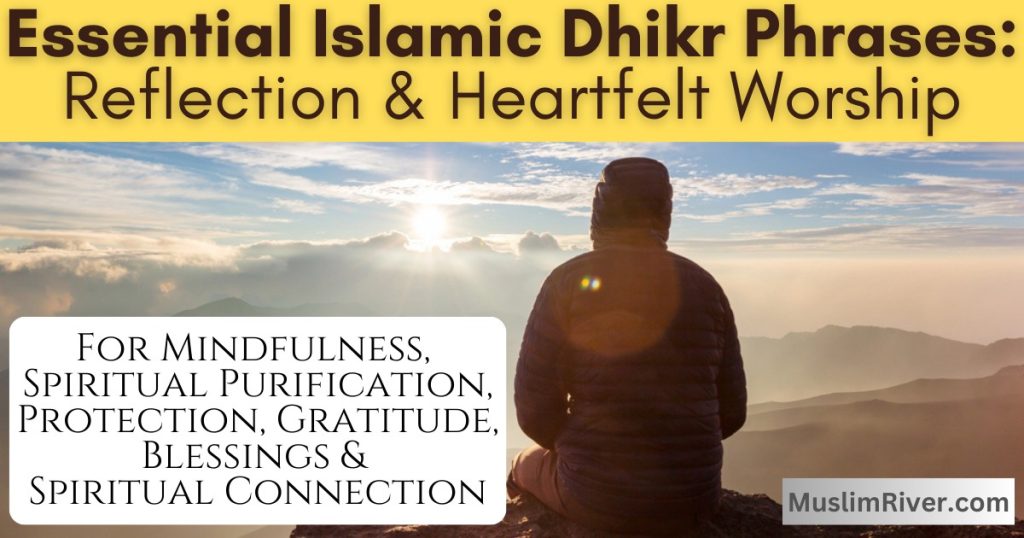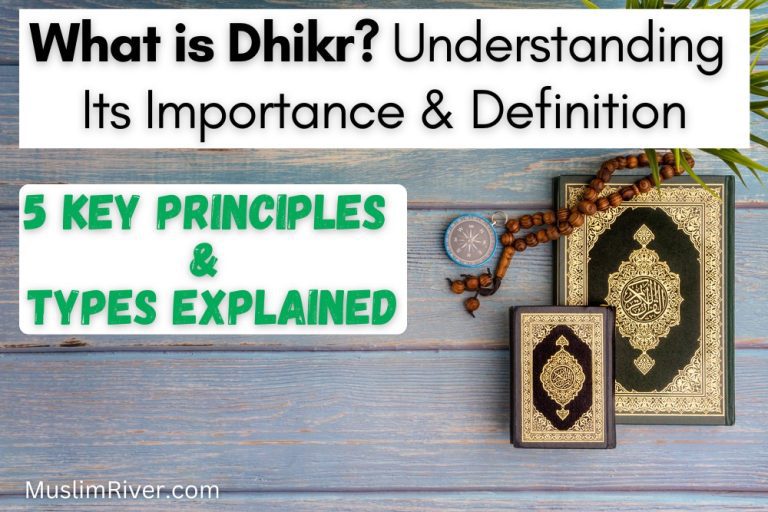Essential Islamic Dhikr Phrases for Spiritual Connection
Do you want to know “simple“ & “credible“ dhikr phrases that strengthen your spiritual goals?
You’re not alone. Dhikr, or remembering Allah, is a powerful way to bring spirituality back into your everyday life.
Dhikr is for everyone from every background. It’s a way to stay connected with Allah’s guidance, no matter where you are or what you’re doing.
In Quran Allah says:
ٱلَّذِينَ ءَامَنُوا۟ وَتَطْمَئِنُّ قُلُوبُهُم بِذِكْرِ ٱللَّهِ ۗ أَلَا بِذِكْرِ ٱللَّهِ تَطْمَئِنُّ ٱلْقُلُوبُ ٢٨
Transliteration: Allatheena amanoo watatma-innuquloobuhum bithikri Allahi ala bithikriAllahi tatma-innu alquloob
Translation: those who believe and whose hearts find comfort in the remembrance of Allah. Surely in the remembrance of Allah do hearts find comfort.
Source: https://quran.com/13/28
Ready to weave some spiritual moments into your day?
Let’s explore some easy dhikr phrases for mindfulness, spiritual purification, protection & connection.
So that you can start using dhikr right now to keep your heart aligned to Allah, no matter how hectic your schedule gets.

Dhikr Phrases For Remembrance and Mindfulness
Simple Dhikr phrases have been proven to not only enhance spiritual growth but also improve mental clarity and focus.
I’ll walk you through the power of simple phrases like “SubhanAllah” and “Bismillah,” and how you can easily incorporate them into your daily routine, no matter how busy your day is.
These phrases, can be repeated anytime, allowing you to stay grounded, reducing stress and guilt over missed spiritual moments.
Here are some powerful Dhikr phrases that you can easily integrate into your day, enhancing mindfulness and spiritual connection:
1. SUBHANALLAH (سبحان الله) – “GLORY BE TO ALLAH” — It is a powerful phrase that declares Allah’s perfection, free from any flaw or imperfection.
It serves as an act of worship, acknowledging Allah’s majesty and sovereignty over all creation. Reciting it regularly purifies the soul, invites Allah’s forgiveness, and provides spiritual peace.
It is a simple yet profound way to seek Allah’s blessings and increase rewards, and when recited with sincerity, it humbles the heart, reminding the believer of their dependence on Allah.
In Quran Allah says:
سَبِّحِ ٱسْمَ رَبِّكَ ٱلْأَعْلَى ١Transliteration: Sabbihi isma rabbika al-aAAla
Translation: Pronounce the purity of the name of your most exalted Lord
Source: https://quran.com/13/28
What if I tell you the most powerful dhikr is “Glorifying Allah”
Watch this inspiring talk by Mufti Menk The Most Powerful Dhikr – Mufti Menk to deepen your understanding about most powerful dhikr.
Regular recitation fosters a deep appreciation of Allah’s flawlessness and omnipresence, grounding us in gratitude and awareness.
2. SUBHANALLAH E WABIHAMDI HI SUBHAN ALLAH HIL AZEEM (سُبحَانَ اللّهِ وَ بِحَمْدِهِ ، سُبحَانَ اللّهِ الْعَظِيمِ) “Glory is to Allah and praise is to Him, Glory is to Allah, the Almighty” — Drawn from Hadith, this phrase enriches the simplicity and magnificence of ‘SubhanAllah’ with a reminder of Allah’s majesty and praise.
تُسَبِّحُ لَهُ ٱلسَّمَـٰوَٰتُ ٱلسَّبْعُ وَٱلْأَرْضُ وَمَن فِيهِنَّ ۚ وَإِن مِّن شَىْءٍ إِلَّا يُسَبِّحُ بِحَمْدِهِۦ وَلَـٰكِن لَّا تَفْقَهُونَ تَسْبِيحَهُمْ ۗ إِنَّهُۥ كَانَ حَلِيمًا غَفُورًۭا ٤٤Tusabbihu lahu assamawatuassabAAu wal-ardu waman feehinna wa-in minshay-in illa yusabbihu bihamdihi walakinla tafqahoona tasbeehahum innahu kana haleemanghafoora
The seven heavens, the earth, and all those in them glorify Him. There is not a single thing that does not glorify His praises—but you ˹simply˺ cannot comprehend their glorification. He is indeed Most Forbearing, All-Forgiving.
Source: https://quran.com/17/44
It’s perfect for enhancing mindfulness, especially during times of reflection or meditation.
Allah’s Messenger (ﷺ) said:
Two words are light on the tongue, weigh heavily in the balance, and are loved by the Most Merciful One: Subḥānallāhi wa biḥamdih, Subḥānallāhi ‘l-`Aẓīm. Allah’s Messenger (ﷺ) said: Two words are light on the tongue, weigh heavily in the balance, and are loved by the Most Merciful One: Glorified is Allah and praised is He, Glorified is Allah the Most Great.
Source: https://sunnah.com/hisn:256
3. BISMILLAH (بسم الله) – “IN THE NAME OF ALLAH” — The phrase “Bismillah” (بِسْمِ ٱللَّهِ) translates to “In the name of Allah,” invoking the sacred name of the One and Only Allah.
It emphasizes that every action, whether big or small, should begin with the remembrance of Allah, recognizing that all power, success, and guidance come from Him alone.
إِنَّهُۥ مِن سُلَيْمَـٰنَ وَإِنَّهُۥ بِسْمِ ٱللَّهِ ٱلرَّحْمَـٰنِ ٱلرَّحِيمِ ٣٠Transliteration: Innahu min sulaymana wa-innahu bismiAllahi arrahmani arraheem
Translation: It is from Solomon, and it reads: ‘In the Name of Allah—the Most Compassionate, Most Merciful.
Source: https://quran.com/27/30
This phrase reflects humility and submission to Allah’s will, acknowledging His sovereignty over all matters.
The Prophet Muhammad (peace be upon him) said:
If any one of you intends to eat, let him say: ‘Bismillah’ (In the name of Allah). If he forgets to say it, then let him say: ‘Bismillah awwalahu wa aakhirahu’ (In the name of Allah, at its beginning and at its end).
Source: https://sunnah.com/hisn:178
This hadith highlights the significance of beginning every action, especially eating, with the name of Allah to ensure blessings and protection.
By invoking “Bismillah,” a Muslim invites Allah’s guidance and blessings, acknowledging His control over all aspects of life.
Start every action with ‘Bismillah’ to ensure that you’re mindful and seeking blessings from Allah from the outset.
This simple invocation brings divine presence into our daily chores and decisions, offering a spiritual start to any activity.
Tips to Integrate Dhikr into Daily Life
ADD INTO AFTER SALAH ROUTINE: Integrating Dhikr (remembrance of Allah) into daily life after Salah (prayer) can enrich your spiritual practice.
SET REMINDERS: Use technology or sticky notes around your home or workspace to remind you to recite Dhikr.
PAIR WITH DAILY TASKS: Connect Dhikr with routine activities, such as saying 'SubhanAllah' while washing dishes or 'Bismillah' when starting your car.
USE 'DEAD TIME': Transform commuting or waiting times into productive moments for spiritual reflection.
BUILD CONSISTENCY: Start small, perhaps with one phrase at a time, and gradually increase as you find comfort and rhythm in your recitations.
EMBRACE FLEXIBILITY: Dhikr doesn't require special times or places; its beauty lies in its accessibility.
Through regular Dhikr, you’ll notice a significant shift in your mental state—more peace, less stress, and a strong sense of connection to your faith.
Remember, it’s not about perfection but progress. Every phrase uttered with sincerity is a step closer to spiritual mindfulness.
Regular Dhikr can transform your mental state, offering increased peace and significantly reducing stress. If you find yourself frequently distracted, try simple pause-and-resume techniques.
Just stop, breathe, and recite a phrase of Dhikr to realign your focus.
Dhikr Phrases For Spiritual Purification and Renewal
Many believe that Dhikr requires a quiet space and a lot of time, but in reality, it can be done anywhere and anytime.
I’ll introduce you to the power of “Astaghfirullah” and “La ilaha illallah,” and how easily these can be added to your daily activities, strengthening your connection to Allah with minimal time investment.
Incorporating powerful phrases into your routine helps you seek forgiveness and reaffirm your faith, allowing you to stay grounded.
These easy-to-remember phrases can be repeated during everyday tasks, offering you a spiritual recharge with minimal effort.
Here are two profound Dhikr phrases that serve as gentle, yet powerful, reminders of Allah’s mercy and our need to seek His forgiveness:
1. Astaghfirullah (أستغفر الله): “I seek forgiveness from Allah.” — This phrase is a cornerstone of spiritual life, encouraging us to continually seek Allah’s forgiveness, thereby promoting repentance, self-awareness, and spiritual cleansing.
As Allah says in the Quran,
As Allah says in the Quran,
وَٱسْتَغْفِرِ ٱللَّهَ ۖ إِنَّ ٱللَّهَ كَانَ غَفُورًۭا رَّحِيمًۭا ١٠٦
Transliteration: Wastaghfiri Allaha inna Allahakana ghafooran raheema
Translation: And seek Allah’s forgiveness—indeed, Allah is All-Forgiving, Most Merciful.
Source: https://quran.com/4/106
Consider reciting “Astaghfirullah” 100 times in the morning and evening to embrace the day with a clear heart and mind.
Narrated Abu Huraira: I heard Allah’s Messenger (ﷺ) saying.” By Allah! I ask for forgiveness from Allah and turn to Him in repentance more than seventy times a day.
Source: https://sunnah.com/bukhari:6307
2. La ilaha illallah (لا إله إلا الله): “There is no deity but Allah.” — This declaration of faith is not just the foundation of our religion; it’s a powerful affirmation that refreshes the heart and reinforces monotheism, revitalizing our faith and spiritual purity.
“La ilaha illallah” can be woven into your daily prayers or recited during moments of contemplation to continually renew your faith.
In Quran Allah says:
وَإِلَـٰهُكُمْ إِلَـٰهٌۭ وَٰحِدٌۭ ۖ لَّآ إِلَـٰهَ إِلَّا هُوَ ٱلرَّحْمَـٰنُ ٱلرَّحِيمُ ١٦٣Transliteration: Wa-ilahukum ilahun wahidunla ilaha illa huwa arrahmanuarraheem
Translation: Your God is ˹only˺ One God. There is no god ˹worthy of worship˺ except Him—the Most Compassionate, Most Merciful.
Source: https://quran.com/2/163
Starting your day or any significant task with these phrases can profoundly impact your sense of spiritual purity and readiness.
In Quran Allah says:
وَهُوَ ٱللَّهُ لَآ إِلَـٰهَ إِلَّا هُوَ ۖ لَهُ ٱلْحَمْدُ فِى ٱلْأُولَىٰ وَٱلْـَٔاخِرَةِ ۖ وَلَهُ ٱلْحُكْمُ وَإِلَيْهِ تُرْجَعُونَ ٧٠Transliteration: Wahuwa Allahu la ilahailla huwa lahu alhamdu fee al-oola wal-akhiratiwalahu alhukmu wa-ilayhi turjaAAoon
Translation: And He is Allah. There is no god but He. Praise is only for Him in the beginning and at the end, and He alone has the right to judge, and to Him you are to be returned.
Source: https://quran.com/28/70
This surah succinctly describes the essence of Allah’s oneness, aligning closely with the belief encapsulated in “La ilaha illallah.”
As you recite these phrases, let each word resonate within, allowing them to purify thoughts and calm the soul. This mindful practice can lead to enhanced tranquility, gratitude, and inner peace.
Remember, Dhikr is more than a ritual; it is a conversation with Allah, a declaration of your devotion, and a way to keep your heart engaged with what truly matters.
Dhikr Phrases For Protection and Reliance
Certain Dhikr phrases, like ‘Hasbunallahu wa ni’mal wakeel,’ hold the power to protect you from harm and increase your reliance on Allah, even in the most difficult situations.
I’ll introduce you to the profound meanings behind “Hasbunallahu wa ni’mal wakeel” and “La hawla wa la quwwata illa billah,” and how you can incorporate them into your daily life for added protection and peace.
By repeating these phrases, you tap into the immense strength and mercy of Allah, helping you feel safe and supported.
Here are two Dhikr phrases that not only offer spiritual protection but also deepen our reliance on Allah:
1. Hasbunallahu wa ni’mal wakeel (حسبنا الله ونعم الوكيل) “Allah is sufficient for us, and He is the Best Disposer of affairs.” This phrase is a profound declaration of trust in Allah, especially in challenging times.
It reminds us that Allah is enough for us in whatever situation we find ourselves.
In Quran Allah says:
إِنَّ ٱللَّهَ هُوَ ٱلرَّزَّاقُ ذُو ٱلْقُوَّةِ ٱلْمَتِينُ ٥٨Transliteration: Wahuwa Allahu la ilahailla huwa lahu alhamdu fee al-oola wal-akhiratiwalahu alhukmu wa-ilayhi turjaAAoon
Translation: Indeed, Allah ˹alone˺ is the Supreme Provider—Lord of all Power, Ever Mighty.
Source: https://quran.com/28/70
This Hasbunallahu wa ni’mal wakeel (حسبنا الله ونعم الوكيل)was the phrase uttered by Prophet Ibrahim (AS) when he was thrown into the fire and by Prophet Muhammad (SAW) and his companions during the Battle of Uhud.
During financial difficulties or when you face a personal crisis, saying “Hasbunallahu wa ni’mal wakeel” can shift your perspective, helping you see beyond the immediate stress.
2. La hawla wa la quwwata illa billah (لا حول ولا قوة إلا بالله): “There is no power or strength except through Allah.” Acknowledging that all strength comes from Allah, this phrase helps us recognize our own limitations and puts our dependence on the One who is all-powerful.
It’s a source of immense strength, especially when facing life’s pressures and temptations.
إِنَّ ٱللَّهَ هُوَ ٱلرَّزَّاقُ ذُو ٱلْقُوَّةِ ٱلْمَتِينُ ٥٨Transliteration: Wahuwa Allahu la ilahailla huwa lahu alhamdu fee al-oola wal-akhiratiwalahu alhukmu wa-ilayhi turjaAAoon
Translation: Indeed, Allah ˹alone˺ is the Supreme Provider—Lord of all Power, Ever Mighty.
Source: https://quran.com/28/70
In moments of temptation or when feeling overwhelmed by life’s demands, “La hawla wa la quwwata illa billah” can serve as a reminder of your reliance on Allah’s strength.
Remember, each time you recite these phrases, you’re not just uttering words; you’re weaving a protective shield around your spiritual and emotional well-being.
They bring significant rewards, as emphasized in various ahadith and the Quran, and they remind us that, no matter the situation, Allah is always with us, guiding and supporting us through every challenge.
Dhikr Phrases For Gratitude
What if the secret to unlocking even more blessings in your life lies in just a few words of gratitude every day?
Let me take you through the impact of “Alhamdulillah,” showing you how this phrase of gratitude can transform your outlook on life and bring more peace, satisfaction, and blessings.
Saying “Alhamdulillah” every day not only acknowledges Allah’s blessings but also invites more peace and satisfaction into your life.
It helps you focus on the positives, no matter the challenges you face, and strengthens your connection with Allah.
Alhamdulillah (الحمد لله): “All praise is due to Allah.” — In our busy lives, it’s easy to overlook the countless blessings that surround us each day.
Sometimes, all it takes is a moment of reflection to change our perspective and recognize the abundance we live in.
ٱلْحَمْدُ لِلَّهِ رَبِّ ٱلْعَـٰلَمِينَ ٢Transliteration: Alhamdu lillahi rabbi alAAalameen
Translation: All praise is for Allah—Lord of all worlds,[1]
[1] i.e., Lord of everything in existence including angels, humans, and animals.
Source: https://quran.com/1/2
“Alhamdulillah” (الحمد لله) is one such powerful Dhikr phrase that anchors us in gratitude and enriches our daily experience by reminding us that all praise is due to Allah.
Alhamdulillah” is straightforward and can be incorporated by anyone, regardless of their schedule or background.
Here’s a quick pronunciation guide: Al-ham-du-lil-lah.
For non-native speakers, understanding how to pronounce this phrase correctly can deepen the sense of connection in Dhikr.
It was narrated from Abu Malik Ash’ari that: The Messenger of Allah said: “Performing ablution properly is half of faith, saying Al-Hamdu Lillah fills the Scale (of good deeds), saying Subhan-Allah and Allahu Akbar fills the heavens and the earth, prayer is light, Zakat is proof, patience is brightness and the Qur’an is proof for you or against you. Every person goes out in the morning to sell his soul, so he either frees it or destroys it.
Source: https://sunnah.com/ibnmajah:280
This Dhikr helps shift focus from what’s missing to what’s present, reducing feelings of overwhelm.
It serves as a constant reminder to appreciate the small and big blessings, enhancing mental and emotional health.
When you recite Dhikr phrases regularly, you invite Allah’s blessings into every moment, reinforcing your reliance on Him and nurturing your soul, leading to a life filled with peace and contentment.
The consistent practice of Dhikr phrases strengthens your faith and invites Allah’s blessings into your heart and life. Through every recitation, you’re reminded of His presence, guidance, and mercy.
Next, we’ll uncover the Dhikr phrases for spiritual connection & blessings, giving you a spiritual shield to navigate life’s obstacles with confidence.
Dhikr Phrases For Spiritual Connection and Blessings
Many think that deep spiritual connection requires long, quiet hours of prayer, but in reality, Dhikr can be done throughout the day, bringing you closer to Allah.
I’ll walk you through the impact of “Allahumma salli ala Muhammad” and “Yaa Hayyu yaa Qayyum,” showing you how these Dhikr phrases can seamlessly fit into your day, bringing you closer to Allah and inviting blessings.
Saying “Allahumma salli ala Muhammad” and “Yaa Hayyu yaa Qayyum” regularly brings you closer to Allah, enhancing your spiritual strength and reliance on Him.
These phrases are quick, meaningful, and can be recited at any moment, even during your busiest times.
Here are two impactful Dhikr phrases that can elevate your spiritual connection and bring abundant blessings into your life:
1. Allahumma salli ala Muhammad (اللهم صل على محمد): “O Allah, send blessings upon Muhammad.” This beautiful dhikr enhances our connection with the Prophet Muhammad (PBUH), encouraging us to follow his sunnah (way of life).
إِنَّ ٱللَّهَ وَمَلَـٰٓئِكَتَهُۥ يُصَلُّونَ عَلَى ٱلنَّبِىِّ ۚ يَـٰٓأَيُّهَا ٱلَّذِينَ ءَامَنُوا۟ صَلُّوا۟ عَلَيْهِ وَسَلِّمُوا۟ تَسْلِيمًا ٥٦Transliteration: Inna Allaha wamala-ikatahu yusalloonaAAala annabiyyi ya ayyuha allatheenaamanoo salloo AAalayhi wasallimoo tasleema
Translation: Indeed, Allah showers His blessings upon the Prophet, and His angels pray for him. O believers! Invoke Allah’s blessings upon him, and salute him with worthy greetings of peace.
Source: https://quran.com/33/56
Each time we send blessings upon him, we are reminded of his teachings, humility, and his devotion to Allah, which fosters a deeper spiritual bond and personal growth.
2. Yaa Hayyu yaa Qayyum (يا حي يا قيوم): “O Living, O Self-Sustaining.” — By invoking these attributes of Allah—eternal life and self-sustenance—we deepen our spiritual connection and reliance on Him.
This Dhikr helps us to acknowledge Allah’s omnipresence and omnipotence, reinforcing our faith in His support and guidance through all of life’s challenges.
ٱللَّهُ لَآ إِلَـٰهَ إِلَّا هُوَ ٱلْحَىُّ ٱلْقَيُّومُ ٢Transliteration: Allahu la ilaha illahuwa alhayyu alqayyoom
Translation: Allah! There is no god ˹worthy of worship˺ except Him—the Ever-Living, All-Sustaining.
Source: https://quran.com/3/2
Regular engagement with Dhikr can lead to significant emotional relief and peace.
Both phrases are supported by numerous Quranic verses and Hadiths that highlight their importance and benefits. For example, the Prophet Muhammad (PBUH) said, “Whoever sends one blessing upon me, Allah will send ten blessings upon him” (Sahih Muslim).
Dhikr empowers individuals by alleviating fears of spiritual inadequacy and enhancing their sense of spiritual fulfillment.
Frequently Asked Questions
1. How Often Should I Perform Dhikr in a Day?
Dhikr can be performed as often as you feel comfortable, but traditionally, Muslims aim to engage in Dhikr during various parts of their day.
Some practices include specific counts of certain phrases, such as saying “SubhanAllah” (Glory be to Allah), “Alhamdulillah” (All praise is due to Allah), and “Allahu Akbar” (Allah is the Greatest) 33 times each after the five daily prayers.
However, there is flexibility, and the most important aspect is consistency and sincerity in the remembrance of Allah.
2. Are There Specific Times During the Day That Are Best for Reciting Dhikr?
While Dhikr can be performed at any time, certain times are considered more spiritually rewarding:
- After the five daily prayers
- Early morning (after Fajr prayer until sunrise)
- Late night (especially the last third of the night)
- Before breaking a fast These times are regarded as moments when Allah is especially close to His servants and more likely to respond to prayers and remembrance
3. What Should I Do if I Miss My Dhikr Practice on Some Days?
If you miss your Dhikr practice, do not be disheartened.
The beauty of Dhikr lies in its ease and accessibility. Simply resume your practice as soon as you remember.
Allah appreciates every effort made in sincerity, regardless of lapses.
The key is to persist and make Dhikr a natural part of your daily routine, without feeling overwhelmed by guilt.
Conclusion
If you’re new to practicing Dhikr, I encourage you to begin with just one simple phrase.
Perhaps start with “Alhamdulillah” to cultivate gratitude or “SubhanAllah” to marvel at Allah’s creation.
These phrases become a natural part of your daily rhythm, you might find yourself ready to explore more, gradually building a more diverse and rich Dhikr practice.
Once you feel comfortable with the basics, consider deepening your practice.
This might involve setting specific times for Dhikr, using technological aids like alarms or apps to remind you, or even joining or forming a Dhikr circle in your community.
Such engagement can amplify the benefits and bring a sense of communal spirituality that is deeply enriching.





